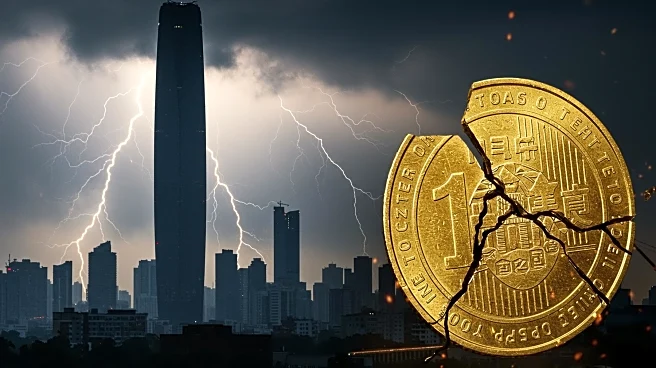What's Happening?
The Chinese property giant Evergrande is facing a severe financial crisis, leading to its shares being removed from the Hong Kong stock market. This follows a suspension of trading in January 2024 and a court order for the company to be wound up. Evergrande's founder, Hui Ka Yan, was fined $6.5 million and banned from China's capital market for life due to overstating the company's revenue by $78 billion. The company, which was declared in default in 2021, has been struggling to manage its $300 billion debt. Evergrande's aggressive expansion strategy, heavily reliant on borrowing, was curtailed by new government regulations in 2020 aimed at controlling debt levels among large real estate developers. This led to significant financial strain, forcing the company to offer properties at major discounts to maintain cash flow.
Why It's Important?
Evergrande's financial troubles have significant implications for the Chinese economy, as the real estate sector accounts for about a third of the country's GDP. The crisis has not only affected the property market but also impacted related industries such as construction, which are major employment sources. The financial sector has also felt the strain due to reduced investment and fundraising activities. The situation has put pressure on consumer spending, a critical component for economic growth, as many Chinese families have invested their savings in property. The broader economic impact is compounded by the Chinese government's shift in focus towards high-tech manufacturing and renewable energy, moving away from real estate as a primary growth driver.
What's Next?
The Chinese government has implemented measures to stabilize the real estate market and support the economy, including providing low-interest loans through the central bank to state-controlled banks. These efforts aim to support struggling real estate projects and encourage consumer spending through incentives for home buyers and household appliance purchases. The long-term economic strategy involves reducing reliance on the real estate sector and enhancing competitiveness in high-tech industries. The outcome of these measures will be closely watched by international investors and economic analysts, as they could influence global economic trends and China's future economic policies.
Beyond the Headlines
The Evergrande crisis highlights the risks associated with aggressive borrowing and expansion strategies in the real estate sector. It also underscores the challenges faced by the Chinese government in balancing economic growth with financial stability. The situation raises questions about the sustainability of China's economic model, which has heavily relied on real estate development. The crisis could lead to a reevaluation of investment strategies and regulatory frameworks within China, potentially influencing global real estate markets and international economic policies.










